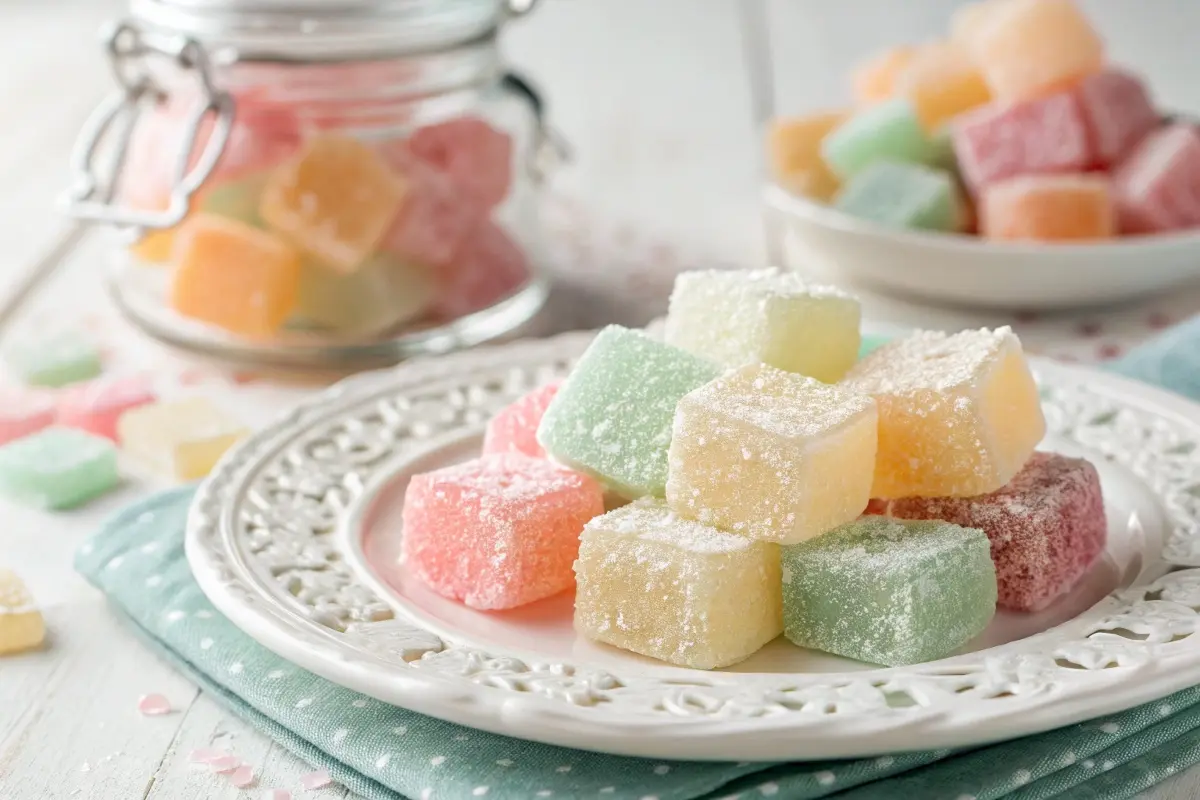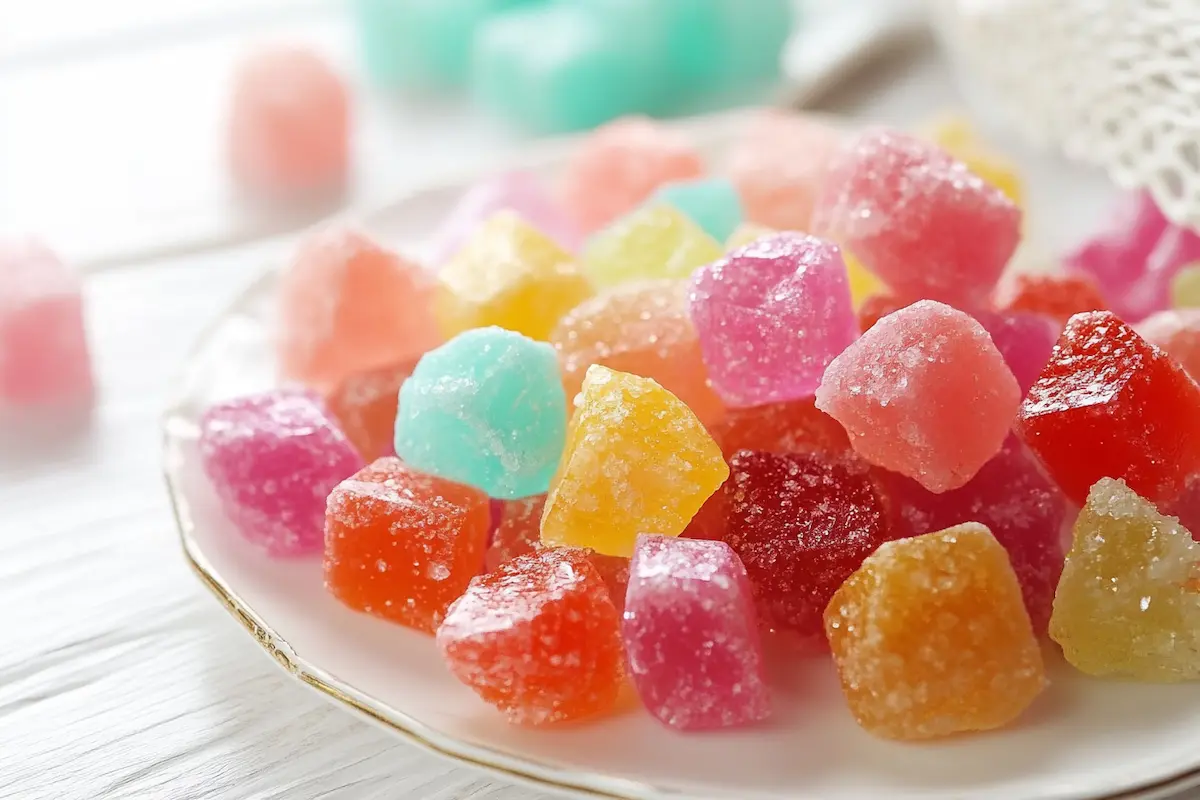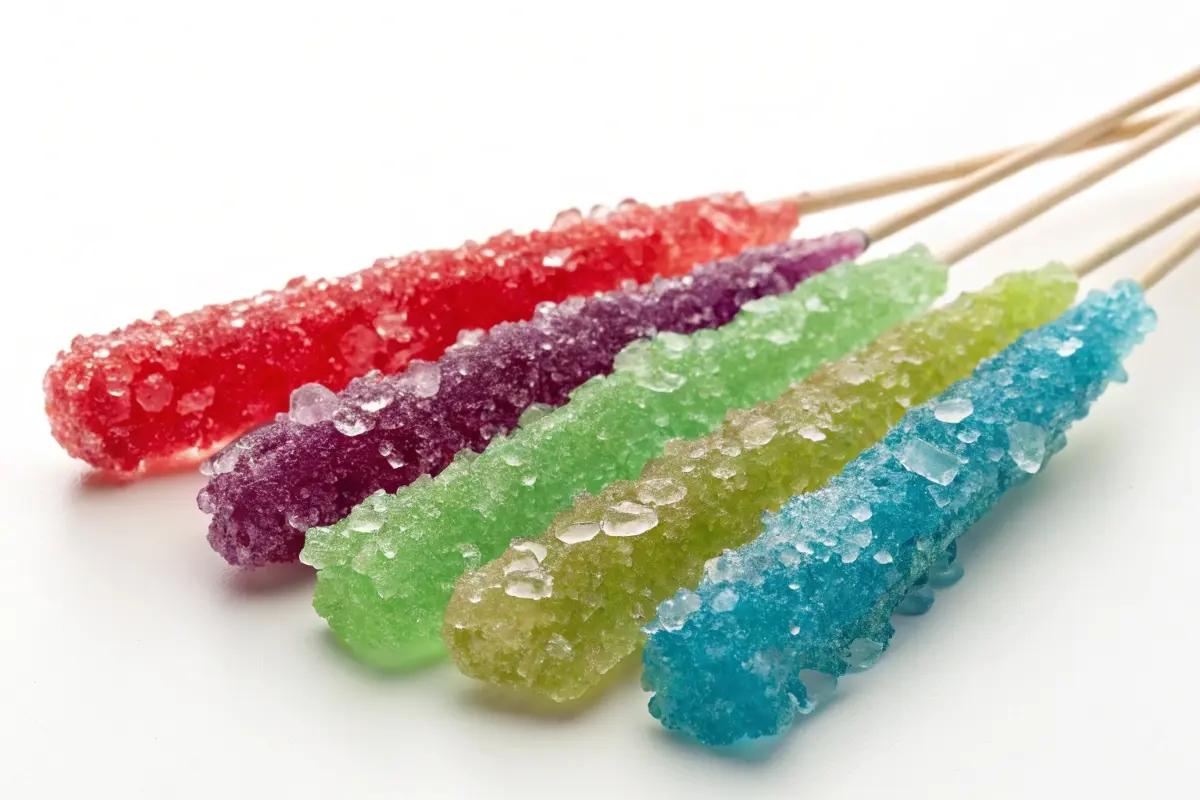Crystal candy, with its glittering appearance and sweet taste, has become a popular treat worldwide. But for those following Islamic dietary laws, the question “Is crystal candy halal?” often comes to mind. Whether you’re shopping for yourself, preparing a gift, or simply curious, understanding the halal status of crystal candy involves digging into its ingredients, production methods, and certifications. Let’s explore this topic in detail to uncover everything you need to know!

Understanding Crystal Candy
What Is Crystal Candy Made Of?
Crystal candy, also called rock candy, is essentially crystallized sugar. The key ingredient, sugar, is dissolved in water and heated to create a supersaturated solution. Over time, this solution cools and forms crystals, giving crystal candy its signature shimmering appearance.
The ingredients list often includes:
- Granulated sugar 🌟
- Water 💧
- Food colorings
- Natural or artificial flavorings
While sugar and water seem harmless, the additives can sometimes raise concerns about whether the candy is truly halal.
Did you know? Crystal candy has been used historically for medicinal purposes, as sugar was believed to have healing properties.
How Crystal Candy Is Manufactured
The manufacturing process for crystal candy is both fascinating and scientific. It all starts with boiling sugar and water to the right concentration. The mixture is poured onto sticks or strings, which act as a base for the crystals to grow. Additives like food coloring and flavoring are introduced during the cooling process to create vibrant and flavorful varieties.
However, there’s a catch! Some food coloring agents or flavoring extracts may contain alcohol or non-halal animal derivatives, making it essential to scrutinize the product for halal certification.
The Concept of Halal in Islam
Defining Halal and Haram
“Halal” simply means permissible, while “haram” refers to anything forbidden under Islamic law. Foods and drinks are considered halal when they are free from:
- Alcohol
- Pork or pork-derived ingredients
- Harmful or intoxicating substances
When it comes to candy, even the smallest trace of haram substances can make a product non-halal. This means every component, including flavorings, dyes, and additives, must comply with halal standards.
Blockquote: “Eat of the lawful and pure things which Allah has provided for you” — [Surah Al-Baqarah: 2:172].
Why Ingredient Sourcing Matters
Let’s say the main ingredient, sugar, is halal—but what if it’s processed with bone char derived from non-halal animals? Or what if food coloring contains cochineal, a dye extracted from insects? These scenarios highlight why ingredient sourcing and processing methods are so critical in determining the halal status of a product.
Ingredients in Crystal Candy and Their Halal Status
Sugar and Sweeteners: Halal or Not?
Sugar is generally halal. However, some refined sugars may involve the use of bone char, a filtration agent derived from animal bones, during processing. Although bone char itself doesn’t end up in the final product, its use in the process can create uncertainty. Halal-certified sugar avoids this issue entirely.
Alternatives:
- Cane sugar
- Beet sugar
- Certified halal sugar
Additives and Flavorings in Crystal Candy
The flavorings in crystal candy can be natural (from plants) or synthetic. However, some natural extracts are suspended in alcohol, a solvent used to dissolve the flavors. This is particularly common with vanilla or fruit extracts.
Solution: Look for products labeled “alcohol-free” or those certified halal.
Food Coloring: Halal Certification for Dyes
Brightly colored crystal candy looks tempting, but not all food dyes are halal. For example:
- Cochineal (E120): Derived from insects, making it non-halal.
- Artificial dyes: Often halal but should have certification to confirm compliance.
Tip: Choose candies with halal-certified or plant-based colorants for peace of mind.

Common Concerns About Crystal Candy and Halal Certification
Cross-Contamination During Production
One of the biggest concerns for halal consumers is cross-contamination. If crystal candy is produced in a facility that handles non-halal ingredients, such as gelatin or alcohol, there’s a risk of contamination. Manufacturers with halal certifications implement strict protocols to prevent this.
Use of Alcohol in Food Manufacturing
Even small amounts of alcohol used as a solvent or preservative can render a product non-halal. Crystal candy manufacturers must ensure any alcohol is either fully evaporated during production or not used at all.
Fun fact: Some halal-conscious brands use glycerin (plant-based) as a solvent instead of alcohol!
Gelatin or Animal-Derived Products in Crystal Candy
While gelatin isn’t a common ingredient in crystal candy, it might be present in coated or flavored varieties. Always check the packaging for halal certification or animal-free labels.
Nutrition Table for Crystal Candy (Approximate Per 100g)
| Nutrient | Quantity |
|---|---|
| Calories | 387 kcal |
| Carbohydrates | 100g |
| Sugars | 99.5g |
| Fat | 0g |
| Protein | 0g |
| Additives | Check packaging for specifics |
How to Identify Halal-Certified Crystal Candy
Reading Food Labels Effectively
When in doubt, food labels are your best friend. Look for:
- The word “halal” prominently displayed
- Certified logos from reputable halal organizations
- Ingredient lists free of suspicious additives like cochineal or alcohol-based flavors
Recognizing Reliable Halal Certifications
Not all halal logos are created equal. Trusted certifiers include:
- Halal Monitoring Committee (HMC)
- Islamic Food and Nutrition Council of America (IFANCA)
- Jabatan Kemajuan Islam Malaysia (JAKIM)
Popular Halal-Certified Crystal Candy Brands
Brands With Global Halal Recognition
In recent years, several brands have made it easier for halal-conscious consumers to enjoy crystal candy without worry. Some of these brands not only follow halal guidelines but also go the extra mile to ensure transparency in their production processes. Here are a few trusted names:
- Candylicious Halal Treats: Known for their vibrant range of crystal candy, this brand uses only halal-certified ingredients. They’re widely available in the Middle East and Southeast Asia.
- Halal Sweets Co.: Based in Europe, this company ensures every product is certified by reputable halal organizations. Their crystal candy comes in a variety of flavors and colors.
- Sweet Treats Malaysia: Popular in the Asia-Pacific region, this brand is recognized for its adherence to JAKIM (Malaysian halal certification).
These brands have set the benchmark for ensuring that their products are not only delicious but also safe for Muslims to consume.
Regional Brands to Explore
If you’re on the lookout for local options, many smaller brands cater to specific regions. For example:
- Riyadh Candy Co. (Saudi Arabia): A favorite among locals for their artisanal crystal candy.
- Indian Halwa House (India): They’ve expanded their range to include halal-certified crystal candy.
When choosing a brand, always look for the halal logo on the packaging or consult their official website for verification.
How to Make Halal Crystal Candy at Home
Why not try making your own crystal candy? It’s a fun and educational activity, and you can control every ingredient to ensure it’s halal.
Simple Recipes Using Halal Ingredients
Here’s a basic recipe for homemade halal crystal candy:
Ingredients:
- 2 cups granulated sugar (halal-certified)
- 1 cup water
- Food coloring (halal-certified, plant-based)
- Flavoring extracts (alcohol-free, such as rose or vanilla)
Instructions:
- Heat the sugar and water in a saucepan over medium heat, stirring constantly, until the sugar dissolves completely.
- Once dissolved, bring the mixture to a gentle boil and then remove it from the heat.
- Add a few drops of your chosen food coloring and flavor extract, stirring well.
- Pour the mixture into a clean glass jar. Insert a stick or string into the jar to act as the base for crystal growth.
- Cover the jar loosely with a cloth to keep dust out and leave it in a cool, dry place for 5-7 days.
- Once the crystals have grown to your desired size, remove the stick and let it dry. Enjoy your homemade, halal-certified treat! 🍭
Tips for Avoiding Non-Halal Additives
- Choose trusted food coloring brands: Many brands specifically label their products as halal.
- Opt for natural flavors: Plant-based extracts ensure no alcohol is involved.
- Sanitize your equipment: Avoid any cross-contamination with non-halal ingredients in your kitchen.
Blockquote: Making your own crystal candy at home is not just fun—it’s a way to guarantee every bite aligns with your values!
The Importance of Halal Awareness in Modern Food Choices
With the globalization of food products, the concept of halal has become increasingly significant—not only for Muslims but also for people who prefer ethical and clean food options. Crystal candy serves as an excellent example of why halal awareness is necessary.
Why is this so important? Because even seemingly simple products like candy may contain hidden ingredients or be manufactured in facilities that handle non-halal items. This raises the need for transparent labeling and trustworthy certifications.
For instance, in countries with a significant Muslim population, halal certification isn’t just a formality—it’s a mark of trust. Consumers rely on these certifications to ensure that their purchases align with their religious beliefs.
Halal Candy in the Global Market
Why the Demand for Halal Sweets is Rising
In recent years, there’s been a noticeable increase in the demand for halal sweets, including crystal candy. This surge is not only driven by the growing Muslim population but also by a broader shift toward clean and ethical eating habits.
Key drivers include:
- Rising awareness about food sourcing
- An increase in Muslim-friendly tourism
- The availability of halal-certified products in international markets
Countries Leading the Halal Candy Market
Countries like Malaysia, Indonesia, Turkey, and the UAE are at the forefront of halal food production. These nations are setting global standards for halal certification and manufacturing practices. Major candy brands from these regions export halal-certified crystal candy to other parts of the world, ensuring that consumers everywhere have access to safe and permissible treats.
What to Look for in a Halal-Friendly Brand
Key Indicators of Trustworthiness
When choosing a halal-friendly crystal candy brand, look for these key indicators:
- Transparency: Does the company openly share details about its production methods and ingredient sourcing?
- Certifications: Are the certifications displayed on the packaging from a recognized halal authority?
- Consumer Reviews: What are people saying about the brand’s credibility and taste?
How to Spot Red Flags
Be cautious if:
- The packaging claims to be halal but lacks certification from a trusted organization.
- Ingredients like “natural flavors” or “artificial colors” are listed without further clarification.
- The brand avoids questions about its manufacturing practices or sourcing.
Halal and Ethical Eating: A Shared Philosophy
One fascinating aspect of halal is its overlap with ethical eating philosophies. Much like veganism or organic food movements, halal practices emphasize purity, cleanliness, and humane treatment of animals.
In the case of crystal candy, opting for halal-certified varieties ensures that the treat not only meets religious requirements but also adheres to ethical food production standards.
Example: Brands that prioritize halal practices often avoid harmful additives, use high-quality ingredients, and implement sustainable manufacturing processes.
Tips for Creating Halal-Friendly Desserts Beyond Crystal Candy
If you love experimenting in the kitchen, you can go beyond crystal candy and try your hand at other halal-friendly desserts. Here are some ideas to inspire you:
- Halal Marshmallows: Use plant-based or halal-certified gelatin for a soft, fluffy treat.
- Flavored Gelatin Candies: Combine halal gelatin with fruit juice for a chewy, fruity snack.
- Chocolate-Coated Rock Candy: Dip your homemade crystal candy in halal-certified chocolate for a luxurious twist!
Pro Tip: Always double-check the origin of ingredients, especially gelatin and flavorings, when creating your desserts at home.
FAQs About Crystal Candy and Halal Standards
What is crystal candy made of?
Crystal candy, also known as rock candy, is primarily made of sugar and water. The process involves dissolving sugar in water to create a supersaturated solution, which is then allowed to cool and form crystals. Additional ingredients, such as food coloring and flavoring, may be included to enhance its appearance and taste.
Is Crystal Candy the same as rock sugar?
Yes, crystal candy and rock sugar are often used interchangeably. However, while both are made through similar crystallization processes, rock sugar is usually less refined and has a more natural, raw look. On the other hand, crystal candy is often enhanced with colors and flavors to make it more appealing as a sweet treat.
Does Crystal Candy taste good?
Absolutely! Crystal candy has a delightful sweetness due to its pure sugar content. Depending on the added flavors, it can also have fruity, floral, or even spicy notes, making it a versatile treat loved by both kids and adults.
Are all sugars automatically halal?
Not necessarily. While sugar itself is usually halal, some refined sugars may be processed with bone char derived from animals. It’s important to look for halal-certified sugar to ensure compliance with Islamic dietary laws.
Can alcohol be present in small amounts in halal foods?
No, even trace amounts of alcohol are not permissible in halal-certified products. This includes flavoring agents or food additives where alcohol is used as a solvent.
Are all food colorings in crystal candy halal-compliant?
Not all food colorings are halal. For example, cochineal (E120) is derived from insects and is not permissible. Always verify the source of food dyes and look for halal certification.
Is Crystal Candy Halal?
The answer to whether crystal candy is halal depends on the ingredients, production methods, and certifications involved. While sugar and water are inherently halal, additives like flavorings, colorings, and stabilizers can complicate things. By opting for halal-certified brands or making your own crystal candy at home, you can enjoy this delightful treat without any doubts.
Halal crystal candy isn’t just a sweet indulgence; it’s a reminder that being mindful about what we consume is a part of living consciously. So the next time you see those glimmering crystals, take a moment to ensure they align with your values—and then savor every bite! 🌟

